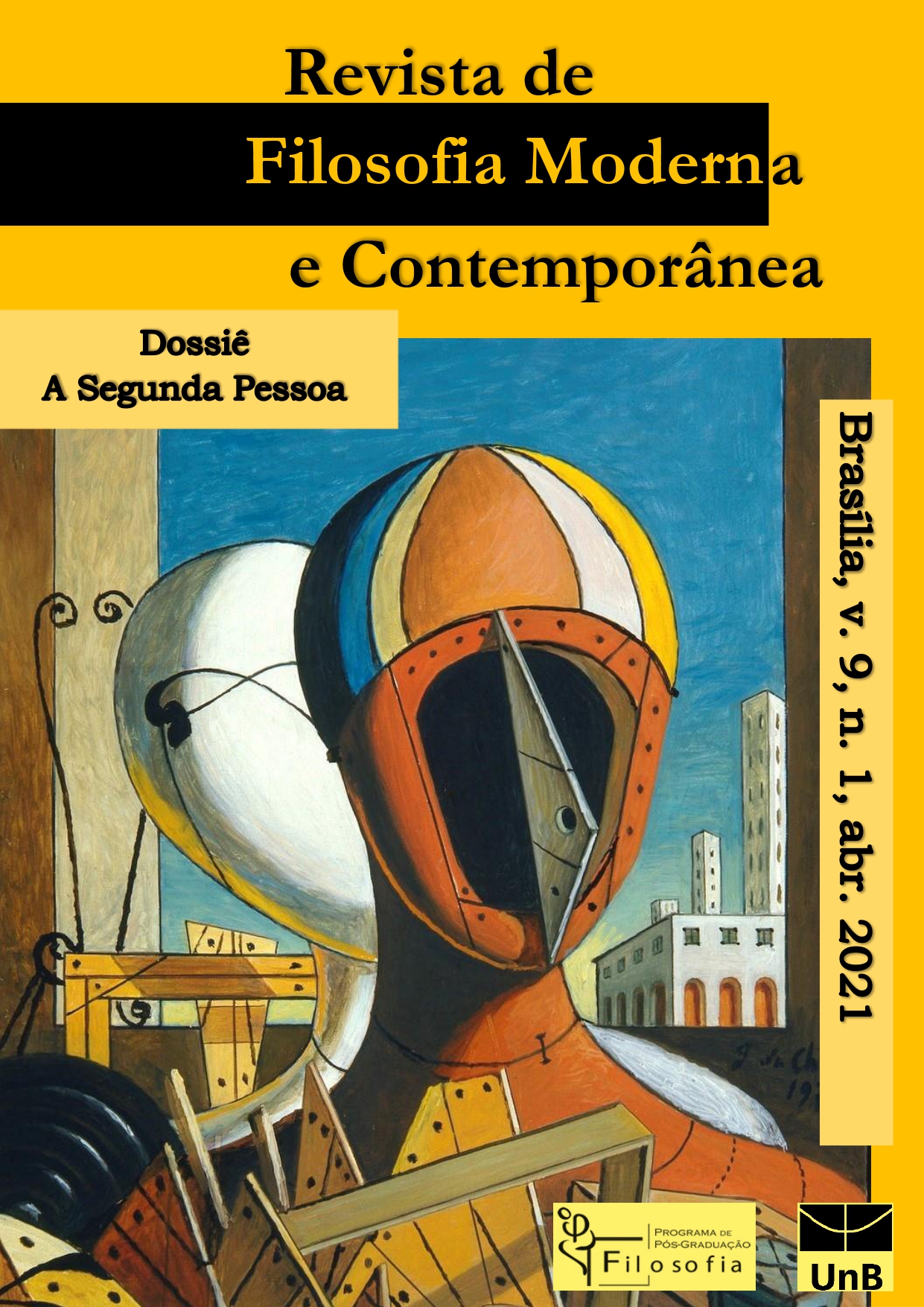Some Notes on Ludwig Wittgenstein’s Philosophical Methods
DOI:
https://doi.org/10.26512/rfmc.v9i1.32095Keywords:
Ludwig Wittgenstein. Philosophical methods. Tractatus’ paradox.Abstract
In his article “Wittgenstein: universalismo, lógica, gramática y lengaje,” Alejandro Tomasini Bassols argues that the trouble Wittgenstein faces at the end of Tractatus””that the propositions contained in his work are elucidations and nonsensical””started with his mistake in considering logic and not language the most universal. Bassols further asserts that the so-called “paradox of the Tractatus” was not a threat against the second Wittgensteinian philosophy, because Wittgenstein himself did not make the same mistake. This article argues that the propositions in Tractatus are paradoxical as a consequence of the picture theory of meaning, and regardless of the ontology in Tractatus. In addition, against Bassols’s opinion concerning the existence of a genuine philosophical progress between Wittgenstein’s first and second philosophies, this article highlights how the main issue in Wittgenstein’s first philosophy is also the main issue in his second philosophy: the paradox of Wittgenstein never having followed his own methods.
Downloads
References
ANSCOMBE, G. E. M. An introduction to Wittgenstein’s Tractatus. Bristol: Thoemmes Press, 1996.
BASSOLS, Alejandro Tomasini. Wittgenstein: universalismo, lógica, gramática y lenguaje. Aurora, v. 29, n. 47, p. 611-638, maio/ago. 2017.
BOUWSMA, O. K. Conversas com Wittgenstein. Lisboa: Relógio D’Água Editores, 2005.
DRURY, M. O’C. Some notes on conversations with Wittgenstein. In: RHEES, Rush (Ed.). Recollections of Wittgenstein: Hermine Wittgenstein; Fania Pascal; F. R. Leavis; John King; M. O’c. Drury. Oxford: Oxford University Press, 1984a, p. 76-96.
_____. Conversations with Wittgenstein. In: RHEES, Rush (Ed.). Recollections of Wittgenstein: Hermine Wittgenstein; Fania Pascal; F. R. Leavis; John King; M. O’c. Drury. Oxford: Oxford University Press, 1984b, p. 97-171.
FOGELIN, Robert J. Wittgenstein. 2. ed. Londres; Nova York: Routledge, 1995.
GELLNER, Ernest. Language and solitude: Wittgenstein, Malinowski and the Habsburg dilemma. Cambridge: Cambridge University Press, 1998.
_____. Words and things. Harmondsworth: Pelican Books, 1968.
GOLDSTEIN, Rebecca. Incompletude: a prova e o paradoxo de Kurt Gödel. São Paulo: Companhia das Letras, 2008.
GLOCK, Hans-Johann. Dicionário Wittgenstein. Rio de Janeiro: Jorge Zahar, 1998.
HACKER, P. M. S. Insight and illusion. 2.ed. Oxford: Oxford University Press, 1986.
_____. Wittgenstein’s place in twentieth-century analytic philosophy. Oxford: Blackwell Publishers, 1996.
JANIK, Allan; TOULMIN, Stephen. A Viena de Wittgenstein. Rio de Janeiro: Editora Campus, 1991.
KENNY, Anthony. Wittgenstein. Oxford: Blackwell Publishing, 2006.
KING, John. Recollections of Wittgenstein. In: RHEES, Rush (Ed.). Recollections of Wittgenstein: Hermine Wittgenstein; Fania Pascal; F. R. Leavis; John King; M. O'c. Drury. Oxford: Oxford University Press, 1984, p. 68-75.
KUUSELA, Oskari; MCGINN, Marie (Ed.). The Oxford Handbook of Wittgenstein. Oxford: Oxford University Press, 2014.
MALCOLM, Norman. Ludwig Wittgenstein: esbozo biografico de G. H. von Wright. Madri: Biblioteca Mondadori, 1990.
MCGUINNESS, Brian. Wittgenstein: el joven Ludwig (1889-1921). Madri: Alianza Editorial, 1991.
MONK, Ray. Wittgenstein: o dever do gênio. São Paulo: Companhia das Letras, 1995.
QUINE, W. V. Palavra e objeto. Petrópolis: Vozes, 2010.
RHEES, Rush (Ed.). Recollections of Wittgenstein: Hermine Wittgenstein; Fania Pascal; F. R. Leavis; John King; M. O'c. Drury. Oxford: Oxford University Press, 1984.
RUSSELL, Bertrand. História do pensamento ocidental: a aventura dos pré-socráticos a Wittgenstein. Rio de Janeiro: Nova Fronteira, 2013.
_____. Introdução ao Tractatus logico-philosophicus. In: WITTGENSTEIN, Ludwig. Tractatus logico-philosophicus. São Paulo: Edusp, 2010, p. 113-128.
SLUGA, Hans D. Wittgenstein. Malden, MA: Wiley-Blackwell, 2011.
SNOWDON, Paul. Private experience and sense data. In: KUUSELA, Oskari; MCGINN, Marie (Ed.). The Oxford Handbook of Wittgenstein. Oxford: Oxford University Press, 2014, p. 402-428.
SOMAVILLA, I. Notas e comentários. In: WITTGENSTEIN, Ludwig. Movimentos de pensamento: diários de 1930-32/1936-37. São Paulo: Martins Fontes, 2010, p. 165-252.
STRAWSON, Peter F. Análise e metafísica: uma introdução à filosofia. Tradução de Armando Mora de Oliveira. São Paulo: Discurso Editorial, 2002.
VON WRIGHT, G. H. Esbozo biográfico. In: MALCOLM, Norman. Ludwig Wittgenstein: esbozo biográfico de G. H. von Wright. Madri: Biblioteca Mondadori, 1990, p. 11-31.
WAISMANN, Friedrich. Ludwig Wittgenstein y el Círculo de Viena. Cidade do México: Fondo de Cultura Económica, 1973.
WITTGENSTEIN, Ludwig. Anotações sobre as cores. Campinas: Editora da Unicamp, 2009.
_____. Cadernos: 1914-1916. Lisboa: Edições 70, 2004a.
_____. Cultura e valor. Lisboa: Edições 70, 1992a.
_____. Da certeza. Lisboa: Edições 70, 1998.
_____. Experiência (onírica) noturna ”“ Anotação de diário de 13/1/1922. In: WITTGENSTEIN, Ludwig. Luz e sombras: uma experiência (onírica) noturna e um fragmento de carta. São Paulo: Martins Fontes, 2012a, p. 34-38.
_____. Fichas (Zettel). Lisboa: Edições 70, 1992b.
_____. Gramática filosófica. São Paulo: Loyola, 2003.
_____. Investigações filosóficas. São Paulo: Abril Cultural, 1999. (Coleção: Os pensadores).
_____. Investigações filosóficas. Petrópolis; Bragança Paulista: Editora Vozes, 2013.
_____. Luz e sombras: uma experiência (onírica) noturna e um fragmento de carta. São Paulo: Martins Fontes, 2012b.
_____. Movimentos de pensamento: diários de 1930-32/1936-37. São Paulo: Martins Fontes, 2010a.
_____. Notas sobre lógica. In: WITTGENSTEIN, Ludwig. Cadernos: 1914-1916. Lisboa: Edições 70, 2004b, p. 137-157.
_____. Observaciones sobre los fundamentos de la matemática. Madri: Alianza Editorial, 1987.
_____. O livro azul. Lisboa: Edições 70, 2008.
_____. O livro castanho. Lisboa: Edições 70, 1992c.
_____. Tractatus logico-philosophicus. São Paulo: Edusp, 2010b.
_____. Wittgenstein’s lectures. Cambridge, 1930-1932: from the notes of John King and Desmond Lee. Lee, Desmond (Ed.). Totowa: Rowman and Littlefield, 1980.
Downloads
Published
How to Cite
Issue
Section
License
Copyright (c) 2021 Journal of Modern and Contemporary Philosophy

This work is licensed under a Creative Commons Attribution-NonCommercial-NoDerivatives 4.0 International License.
Copyright for articles published in this journal is retained by the authors, with first publication rights granted to the journal. By virtue of their appearance in this open access journal, articles are free to use, with proper attribution, in educational and other non-commercial settings.


